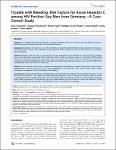Trouble with Bleeding: Risk Factors for Acute Hepatitis C among HIV-Positive Gay Men from Germany—A Case-Control Study
Schmidt, Axel J.
Rockstroh, Jürgen
Vogel, Martin
Heiden, Matthias an der
Baillot, Armin
Krznaric, Ivanka
Radun, Doris
Objectives: To identify risk factors for hepatitis C among HIV-positive men who have sex with men (MSM), focusing on potential sexual, nosocomial, and other non-sexual determinants. Background: Outbreaks of hepatitis C virus (HCV) infections among HIV-positive MSM have been reported by clinicians in post-industrialized countries since 2000. The sexual acquisition of HCV by gay men who are HIV positive is not, however, fully understood. Methods: Between 2006 and 2008, a case-control study was embedded into a behavioural survey of MSM in Germany. Cases were HIV-positive and acutely HCV-co-infected, with no history of injection drug use. HIV-positive MSM without known HCV infection, matched for age group, served as controls. The HCV-serostatus of controls was assessed by serological testing of dried blood specimens. Univariable and multivariable regression analyses were used to identify factors independently associated with HCV-co-infection. Results: 34 cases and 67 controls were included. Sex-associated rectal bleeding, receptive fisting and snorting cocaine/ amphetamines, combined with group sex, were independently associated with case status. Among cases, surgical interventions overlapped with sex-associated rectal bleeding. Conclusions: Sexual practices leading to rectal bleeding, and snorting drugs in settings of increased HCV-prevalence are risk factors for acute hepatitis C. We suggest that sharing snorting equipment as well as sharing sexual partners might be modes of sexual transmission. Condoms and gloves may not provide adequate protection if they are contaminated with blood. Public health interventions for HIV-positive gay men should address the role of blood in sexual risk behaviour. Further research is needed into the interplay of proctosurgery and sex-associated rectal bleeding.
No license information

